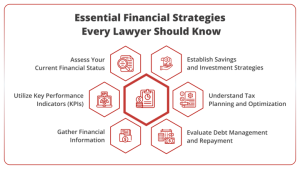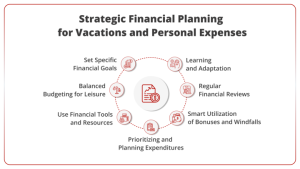You’re used to tracking every minute for billing, which highlights how critical time is in your profession. With all the focus on meeting client needs and deadlines, who ensures your financial future is just as well cared for?
For many lawyers, especially those who have become partners at mid-sized or larger firms, managing finances can be as challenging as the most complex cases you’ve handled. Although you have the potential to earn a lot, the early years are often spent offsetting these earnings against the need to reinvest in your practice or manage unpredictable cash flows, which complicates your financial security.
Deciding how to use your income can be overwhelming as you become more successful. Should you pay off debts faster, save for your children’s education, or put more into your retirement savings? These choices are crucial for your financial health and peace of mind. Having a financial plan that fits your professional and personal situation can give you great comfort, allowing you to focus on advocating for your clients.
This blog will guide you through effective financial planning, covering everything from managing earnings to budgeting for vacations and other personal expenses.
Why Is Financial Planning Crucial for Lawyers?
As a lawyer, strategic financial planning is crucial as it supports your career and personal life, influencing everything from lifestyle choices to long-term peace of mind. Let’s examine why you must manage your finances to secure your future while enjoying the present.
Securing Your Retirement
Retirement might seem a long way off, especially if you’re in the early stages of your career. However, starting early is vital for lawyers, particularly those in private practices or firm partnerships. Familiarize yourself with different retirement plans—whether it’s a 401(k) through your firm, an IRA, or perhaps a pension plan. Understanding these options will allow you to create a retirement savings plan that fits your lifestyle and adjusts to your living standards as they evolve.
Investing in Real Estate
Real estate investments offer both a hedge against inflation and a potential source of passive income. Whether considering a cozy vacation home or an investment property, align your real estate purchases with your overall financial strategies. Think about how owning property can complement your financial goals, providing you with assets that appreciate over time.
Planning for Education and Family Legacy
If family is a part of your plan, setting aside funds for your children’s education is imperative. Explore vehicles like 529 plans, which are tax-efficient and pivotal in ensuring that you can support your children’s educational goals without compromising your financial security. Beyond education, consider how you wish to leave a legacy—whether through family trusts, wills, or charitable giving. Effective estate planning ensures your assets are managed and distributed according to your wishes, providing peace of mind and security for those you care about most.
Expanding Your Legal Practice
For many lawyers, the ultimate career goal involves either starting their practice or expanding an existing one. This ambition requires meticulous financial planning, covering everything from initial start-up costs to operational expenses and potential business growth. If the partnership is in your plans, prepare for the financial commitments of equity partnerships, including buy-ins and sharing the fiscal responsibilities of business operations.
What Lawyers Should Consider in Financial Planning?
Here’s a simplified breakdown of critical financial planning areas for lawyers to ensure long-term stability and achieve personal and career goals:
- Cash Flow Management: Effective financial planning starts with understanding your cash flow. Despite high earnings, lawyers often face high expenses due to demanding lifestyles. To improve your savings rate, prioritize setting realistic savings goals and reducing unnecessary expenditures.
- Debt Strategy: Given the substantial debt many lawyers accumulate from law school, developing a strategic approach to debt repayment is crucial. Explore all options, including loan forgiveness programs and refinancing, to manage or reduce your debt burden effectively.
- Asset Allocation: Choose investments that align with your risk tolerance and financial goals. Diversify your portfolio across different asset classes like stocks, bonds, and real estate to optimize returns and manage risks, particularly if you have long-term goals like purchasing a home or funding education.
- Tax Planning: To maximize your savings, utilize tax-advantaged accounts such as 401(k)s and IRAs. Plan the timing of capital gains and consider holding assets for over a year to benefit from lower long-term capital gains tax rates.
- Retirement Planning: Aim to accumulate savings worth at least 25 times your annual retirement expenses to maintain your lifestyle without depleting your savings. Early and aggressive saving can make a significant difference due to compound interest.
- Insurance Coverage: Assess and adjust your insurance coverage regularly to protect against unexpected life events. This includes personal insurance policies like health, life, and disability and professional ones like malpractice insurance, which is especially critical for legal practitioners.
Addressing these factors with a focused and strategic approach can help you build a financial plan that meets your immediate needs and secures your financial future.
Essential Financial Strategies Every Lawyer Should Know
Starting your financial journey can seem overwhelming, especially with the demands of a legal career. However, taking control of your finances is crucial for long-term security and peace of mind. Here are essential financial strategies that you must know:
1. Assess Your Current Financial Status
Before determining future goals, it’s essential to understand where you stand financially. This initial step involves a comprehensive review of your firm’s cash inflows and outflows. Start by analyzing your current financial state:
- Income Review: Document all sources of income, including regular billable hours, retained clients, and any other legal services provided.
- Expense Analysis: List all firm-related expenses, such as office rent, utilities, staff salaries, and other operational costs. This will give you a clear picture of where your money is going and highlight areas where you can cut costs.
- Budget Creation: Use this information to create a detailed budget. A well-structured budget is an invaluable tool that acts as a roadmap for spending, helping you manage your finances more effectively and set aside money for future investments or savings.
2. Utilize Key Performance Indicators (KPIs)
Understanding key performance indicators (KPIs) is essential for law firms and individual lawyers to gauge their performance effectively. Focusing on three primary KPIs—utilization rate, realization rate, and collection rate—can provide deep insights into financial health and operational efficiency.
| KPI | What It Indicates | Benefits for Law Firms | Benefits for Individual Lawyers |
| Utilization Rate | The ratio of billable hours to total hours worked. | You can track how effectively your attorneys use their time on billable tasks, helping you manage efficiency and workload better. | You can monitor your productivity and manage your time to maximize billable activities, enhancing efficiency. |
| Realization Rate | The proportion of billable hours that are invoiced. | It aids in evaluating billing efficiency and whether your work meets client billing policies. | It helps you review how well you capture billable hours, allowing you to make necessary adjustments to improve your billing practices. |
| Collection Rate | The percentage of invoiced hours that are paid. | It’s essential for determining the accuracy of your firm’s invoicing and follow-up processes. | It helps you review how well you capture billable hours, allowing you to make necessary adjustments to improve your billing practices. |
3. Gather Financial Information
Understanding and managing financial data is crucial for effective lawyer planning. After gathering your initial data, such as financial statements, tax records, and vendor agreements, integrating the right software tools can significantly streamline this process.
Clio Manage, for instance, offers a comprehensive solution for tracking financial reports and managing client accounts directly from its dashboard, ideal for maintaining up-to-date records. QuickBooks provides extensive general bookkeeping and tax preparation features, helping law firms keep their financials in order. Similarly, Xero offers real-time financial monitoring suitable for small to medium-sized practices, while FreshBooks is perfect for solo practitioners focusing on invoicing and expense tracking.
4. Establish Savings and Investment Strategies
- Individual Lawyers
-
-
- Establish an emergency fund to cover unexpected personal expenses, ensuring financial security during slow periods or emergencies.
- Your portfolio should include a mix of assets, such as stocks, bonds, and real estate, alongside retirement accounts like IRAs or 401(k)s.
- Consult a financial advisor to tailor investment strategies to your financial goals and risk tolerance.
- Continuously assess and adjust your investment plan to align with your financial objectives and market conditions.
-
- Law Firms
-
-
- Set aside funds for unforeseen business expenses to maintain operations during downturns.
- Develop a comprehensive succession plan to ensure the firm’s stability and continuity.
- Invest firm revenues in various assets to mitigate risks and increase returns.
-
5. Understand Tax Planning and Optimization
It is crucial to learn about the specific tax implications for legal professionals. Hiring a tax specialist can provide significant benefits.
- Both individual lawyers and firms should take full advantage of tax deductions to reduce taxable income.
- Utilize tax-advantaged retirement accounts to save for the future while reducing current tax liabilities.
- Work with financial experts to devise strategies that minimize tax liabilities and enhance profitability.
6. Evaluate Debt Management and Repayment
Thoroughly evaluate and prioritize your debts, from student loans to credit cards. Explore refinancing to secure lower interest rates, reducing the cost of debt over time. Develop a repayment strategy for your income and financial goals.
For law firms, consider regularly reviewing the firm’s finances to align revenue management, savings, and debt repayment strategies. Prioritize high-interest or high-balance debts to reduce the firm’s debt burden.
Strategic Financial Planning for Vacations and Personal Expenses
For lawyers, successful financial planning balances professional duties with personal needs like vacations and leisure. Given the demanding nature of legal work, these breaks are crucial for recharging. Here’s how to manage finances effectively while accommodating personal expenses:
Set Specific Financial Goals
Distinguish between long-term financial stability and short-term desires. Long-term goals might include retirement savings, while short-term goals might include annual vacations.
Balanced Budgeting for Leisure
Designate a portion of your income for personal enjoyment, which includes travel and hobbies. Ensure this amount is realistic, allowing enjoyment without diverting funds from essential savings and investments.
Pro Tip: If your income increases, resist the temptation to increase your leisure spending proportionally. Instead, increase your savings rate.
Use Financial Tools and Resources
Utilize tools that automatically transfer a set amount to a savings account designated for vacations and personal expenses. Apps and software can help monitor where your money goes, making it easier to adjust and stay on target with savings and spending.
Prioritizing and Planning Expenditures
If travel is important, consider cutting back on other less valued discretionary expenses. This will allow you to allocate more funds to travel, enrich your experiences, and ensure you manage your budget effectively and maintain a healthy balance between enjoying life and staying financially sound.
Smart Utilization of Bonuses and Windfalls
Direct unexpected bonuses and windfalls into your personal expense account. This strategy allows you to cover larger personal expenses without disrupting your financial plan.
Regular Financial Reviews
Life changes, and so should your financial plan. Regularly reviewing your financial status allows you to adjust your savings goals and spending habits. Use these reviews as opportunities to refine your budget, cut unnecessary expenses, and improve your overall financial health.
Learning and Adaptation
Keep up with financial advice and strategies through books, seminars, and courses. Embrace Destination CLE’s Eduvacation℠, which integrates enriching travel experiences with ongoing education. As the economic environment changes, be ready to adapt your financial strategies to maintain stability and meet your personal goals.
Smart Budgeting with Destination CLEs: Merging Travel and Education
Integrating Destination CLEs into your vacation plans enriches your professional skills and optimizes your financial planning. Here’s how incorporating these educational trips can be financially advantageous:
- Dual-Purpose Travel: Combine the costs of vacation and professional development. Managing your travel with CLE requirements in mind can lead to overall expense reductions.
- Tax Deductibility: Many travel expenses related to attending CLE sessions are tax-deductible, offering you potential savings.
- Streamlined Budgeting: Allocate funds for professional growth and personal leisure in one step, simplifying your financial management for the year.
- Value-Added Learning: Earn required CLE credits in engaging, relaxing environments, improving the value of your travel investment.
- Networking Opportunities: Use these trips to meet other legal professionals, which can lead to new referrals or collaborative opportunities, indirectly boosting your practice’s revenue potential.
Strategically plan your vacations with Destination CLEs to wisely use your time and resources, ensuring you meet your educational obligations while enjoying personal relaxation.
Explore, Learn, Network: Secure Your Spot at Destination CLEs
Destination CLEs redefines the way legal professionals meet their continuing education requirements. Our conferences blend educational opportunities with cultural immersion in some of the world’s most captivating cities.
Why Choose Destination CLEs?
- Meet CLE Requirements: Fulfill your mandatory CLE credits through engaging, high-quality seminars in stunning global locations.
- Transformative Learning: Turn the usual lecture-based learning on its head by engaging in sessions as dynamic as the destinations.
- Networking Opportunities: Connect with peers worldwide, expanding your professional network in settings that encourage collaboration and growth.
- All-Inclusive Experience: Enjoy comprehensive packages that cover educational sessions, accommodations, and unique cultural experiences, making your learning adventure seamless and memorable.
- Efficient Credit Earning: Earn required CLE credits efficiently, with schedules that balance professional development and exploration.
Plan your next educational journey with Destination CLEs and ensure extraordinary professional development. Our 2024-2025 lineup includes diverse locales such as Lisbon, Puerto Vallarta, Dubai, Havana, and an Alaska Cruise—each offering a distinct blend of legal education and local culture.
Secure your spot today and become part of a community dedicated to professional growth and networking.
DestinationCLEs.com is a participant in the Amazon Services LLC Associates Program, an affiliate advertising program designed to provide a means for sites to earn advertising fees by advertising and linking to Amazon dot com.













